The FIFA Club World Cup 2025, in its 21st edition, has already delivered a compelling narrative as it progresses towards the Round of 16. This year's revamped format, featuring an expanded field of teams, a redesigned trophy, multiple venues, and even referee cams, is bringing the competition closer to the spectacle of the quadrennial World Cup.
Organizers have positioned the tournament as "a celebration of hope, excellence and pride," underscoring the collective passion uniting clubs, players, and fans. The month-long event has seen several debutants emerge, significantly elevating the competition's profile.
Now featuring teams from all six confederations – 12 from Europe, 6 from South America, 4 each from Africa, Asia, and North/Central America and the Caribbean, 1 from Oceania, and the host nation's representative – the 2025 FIFA Club World Cup has been rife with upsets, David vs. Goliath encounters, and intense moments both on and off the pitch.

Image credit: FIFA.com
Auckland City, ranked a distant 4,971st in the Opta Power Rankings, entered the tournament as the lowest-ranked team. Drawn into a group with powerhouses like Bayern Munich, Benfica, and Boca Juniors, their chances appeared slim. It’s worth noting that Auckland City's roster is comprised largely of amateurs who compete in New Zealand's Northern League, a competition with only 12 teams.
Their tournament began with a humbling 0-10 defeat to Bayern Munich, the largest margin of victory thus far, followed by a 0-6 loss to Benfica.
Facing elimination, Auckland City confronted Argentinian giants Boca Juniors in their final match. Against all odds, the underdogs secured a 1-1 draw, denying Boca Juniors a crucial victory needed to advance to the Round of 16. The disparity of 4,819 ranking points made the result a monumental achievement for the amateurs.
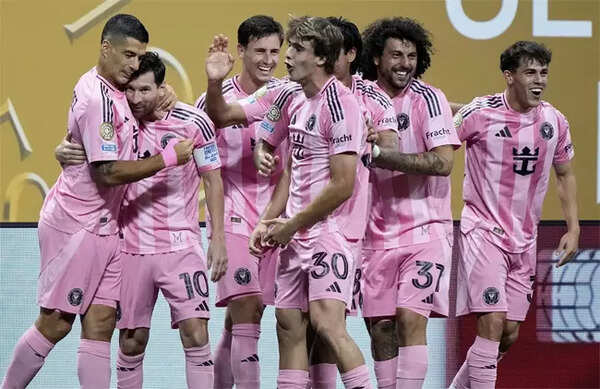
Inter Miami's Lionel Messi celebrates with Luis Suarez after scoring against FC Porto (AP Photo)
Inter Miami, featuring Lionel Messi, Luis Suarez, Jordi Alba and Sergio Busquets, defied expectations by progressing to the Round of 16 from a group that included Porto, Al Ahly, and Palmeiras.
Despite securing only one win, Miami's campaign was marked by moments of brilliance. After a draw against Al Ahly, Messi's stunning free-kick secured a 2-1 victory against Porto. A 2-2 draw against Palmeiras sealed their place in the next round.
Tensions flared on the final matchday in Group E, where River Plate's Marcos Acuna and Inter's Denzel Dumfries nearly came to blows after Inter denied River a spot in the last 16. The incident was rooted in a previous encounter three years prior, with Acuna reminding Dumfries of Argentina's victory over the Netherlands in the 2022 World Cup quarter-final.
Extreme heat also played a significant role in the tournament. Teams resorted to ice baths and cold towels to combat the conditions. Borussia Dortmund even had substitutes watch a game from the locker room to shield them from the heat, with their coach likening the environment to a "sauna." Thunderstorms and lightning caused delays in multiple games.
Furthermore, ICE (US Immigration and Customs Enforcement) and Customs and Border Protection (CBP) have a notable presence at the tournament, requiring non-citizens to provide proof of legal status to attend matches.
With the 2026 FIFA World Cup, co-hosted by the United States, Mexico, and Canada, less than a year away, the Club World Cup has highlighted potential challenges. Issues such as pitch quality and extreme weather conditions have raised concerns.
Real Madrid's Jude Bellingham criticized the pitch conditions, stating, "The pitches aren’t great here. The pitches aren’t great at all."
Despite the emergence of underdog stories and surprising results, established European powerhouses continue to dominate. Real Madrid and Manchester City remain among the favorites to win the tournament. Notably, Seattle Sounders, Urawa Reds, Ulsan, Wydad AC and Pachuca were all eliminated without earning a single point.
Newer articles
Older articles
 Heart Attack: Don't Ignore These 5 Early Warning Signs That Can Appear Weeks Before
Heart Attack: Don't Ignore These 5 Early Warning Signs That Can Appear Weeks Before
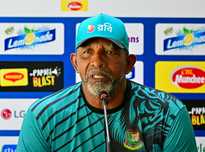 Bangladesh Coach Phil Simmons Temporarily Steps Away From Sri Lanka Tour for Medical Checkup
Bangladesh Coach Phil Simmons Temporarily Steps Away From Sri Lanka Tour for Medical Checkup
 Hydration Habits Could Significantly Lower Risk of Heart Disease, New Study Suggests
Hydration Habits Could Significantly Lower Risk of Heart Disease, New Study Suggests
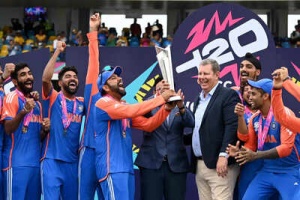 Rohit Sharma Hails T20 World Cup Win: 'Barbados Forever in My Veins' After India's Triumph
Rohit Sharma Hails T20 World Cup Win: 'Barbados Forever in My Veins' After India's Triumph
 FIFA Club World Cup 2025: Upsets, Messi Magic, and 2026 World Cup Concerns Emerge
FIFA Club World Cup 2025: Upsets, Messi Magic, and 2026 World Cup Concerns Emerge
 Astronaut Shukla to Connect with Indian Students, ISRO Scientists from Orbit
Astronaut Shukla to Connect with Indian Students, ISRO Scientists from Orbit
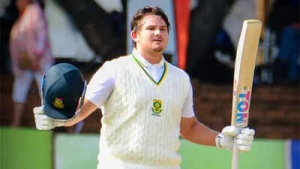 Teenage Star Lhuan-dre Pretorious Smashes 61-Year Record, Youngest South African to Score Test Century on Debut
Teenage Star Lhuan-dre Pretorious Smashes 61-Year Record, Youngest South African to Score Test Century on Debut
 Black Caps Set for Blockbuster Home Summer Against Cricket Giants Australia, England, South Africa & West Indies
Black Caps Set for Blockbuster Home Summer Against Cricket Giants Australia, England, South Africa & West Indies
 Steve Smith Eyes Grenada Test Return After Injury Layoff
Steve Smith Eyes Grenada Test Return After Injury Layoff
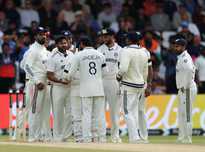 India's Batting Woes: Coach Gambhir Defends Lower Order After Test Collapse
India's Batting Woes: Coach Gambhir Defends Lower Order After Test Collapse